Thai Lao Yeh (太老爺) is not your usual Thai restaurant in Taipei. It has the ambience of a bistro, featuring the food of Thailand’s Northeastern region in small plates, boosted by a solid selection of beer and wine. The restaurant’s interior was designed by Yeh Yu-ching (葉裕清), a Taiwanese designer who has lived in Thailand for nearly 20 years. Yeh has also built and ran a couple of popular Bangkok hotels.
It was just recently that Yeh expanded his undertaking to Taipei, with Thai Lao Yeh’s third branch opening three months ago at the intersection of Shaoxing South Street (紹興南街) and Xuzhou Road (徐州路). My dining companions and I visited this branch on a weekend. Adorned with a lush outdoor seating area in a quiet, shady neighborhood, the restaurant is appealing from the outside. Inside, the rare high ceiling and bamboo wall coverings exude a laid-back, tropical charm. Lighting is dim and hazily pleasant at night.
According to the restaurant’s Facebook page, its menu centers on Northeastern Thai cuisine, which shares notable influences from culinary traditions in the bordering countries of Laos and Cambodia. Richly flavored and served in small portions, the majority of the dishes lend themselves to sharing among friends.
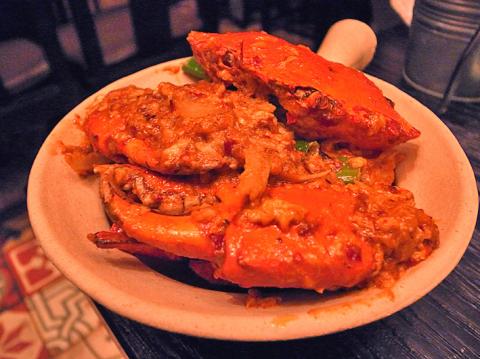
Photo: Ho Yi, Taipei Times
Delectable tidbits such as deep-fried fish cake (炸魚餅, NT$120) and deep-fried chicken feet (炸雞爪, NT$120) are common street foods in Thailand. Eaten with chili peppers, garlic and slices of lettuce, the sour pork sausage (烤東北酸香腸, NT$160) was a fun treat but not as tart-tasting as its name suggests.
A bit of Laotian influence can be detected in the spicy larb salad with minced beef, Laotian style (辣拌寮國牛, NT$180). Known as larb, the salad is composed of minced meat and herbs, spiced with lemon juice, chili peppers and fermented fish sauce. The spicy nam tok salad with pork neck (辣淋松阪豬, NT$180) is a similar appetizer seasoned with lemongrass and fish sauce.
The dish that won unanimous approval on our table was the Thai curry fat crab (泰式咖哩肥蟹, NT$680 or NT$1,280). Cooked with chili oil, chicken bones and creamy red curry sauce, the food is as messy as it is gratifying, and you are left licking your fingers and wanting more.
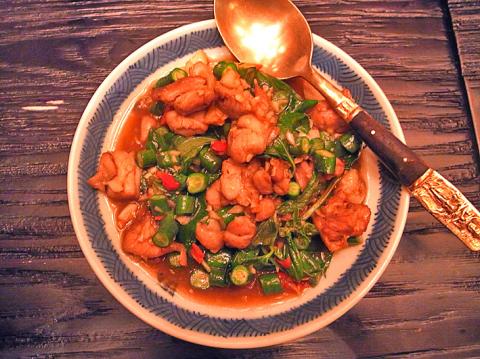
Photo: Ho Yi, Taipei Times
Also on offer are several other crustacean dishes originating from different parts of Southeast Asia, such as the Laotian garlic and chili deep-fried fat crab (寮國蒜炸肥蟹, NT$680), Vietnamese garlic and butter grilled fat crab (越式蒜烤肥蟹, NT$680) and the Thai fat crab fried with holy basil (泰式打拋肥蟹, NT$680).
Another specialty of Thai Lao Yeh is its fine selection of soup. The spicy soup with chicken feet (酸辣雞爪湯, NT$120 or NT$320) is said to be to a hangover cure which is popular amongst young club-hoppers in Thailand. Another must-try is the tom yum goong, or what the restaurant calls its famous hot spicy soup with shrimp (苳茵酸辣鮮蝦湯, NT$160 or NT$420).
Other recommended dishes include stir-fried holy basil with seafood (打拋海鮮, NT$210), grilled chicken thigh with lemongrass (烤雞腿, NT$160) and the Thai hot pot (太老爺火鍋) (NT$680 for two) with tom yum soup base.
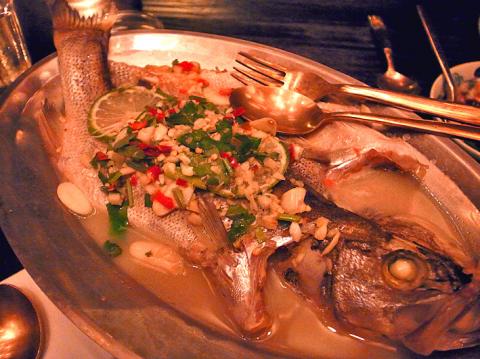
Photo: Ho Yi, Taipei Times
Apart from the a la carte menu, there are three types of set meals for groups of two, four and six (NT$620, NT$1,320 and NT$1,800). To pair with the richly flavorful food, the restaurant offers a collection of red, white and sparkling wine from France and Germany (NT$680 to NT$2,080).
Thai Lao Yeh has another venue in the city, located at Taipei Expo Park (花博公園). Tel: (02) 2597-1508. Those interested in checking out its Bangkok headquarters can go to www.cabochonhotel.com.
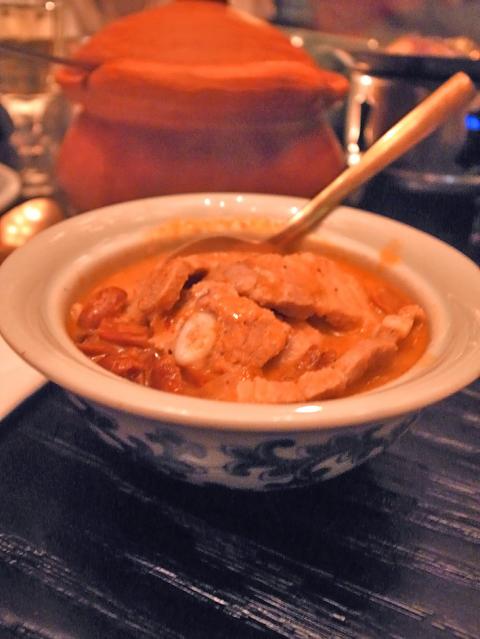
Photo: Ho Yi, Taipei Times
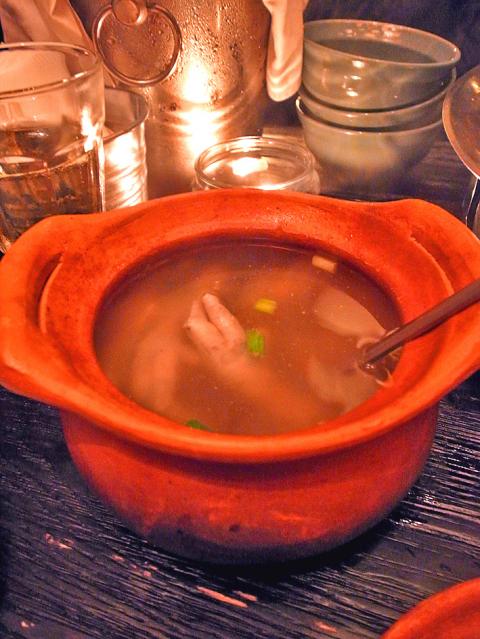
Photo: Ho Yi, Taipei Times

Most heroes are remembered for the battles they fought. Taiwan’s Black Bat Squadron is remembered for flying into Chinese airspace 838 times between 1953 and 1967, and for the 148 men whose sacrifice bought the intelligence that kept Taiwan secure. Two-thirds of the squadron died carrying out missions most people wouldn’t learn about for another 40 years. The squadron lost 15 aircraft and 148 crew members over those 14 years, making it the deadliest unit in Taiwan’s military history by casualty rate. They flew at night, often at low altitudes, straight into some of the most heavily defended airspace in Asia.

Beijing’s ironic, abusive tantrums aimed at Japan since Japanese Prime Minister Sanae Takaichi publicly stated that a Taiwan contingency would be an existential crisis for Japan, have revealed for all the world to see that the People’s Republic of China (PRC) lusts after Okinawa. We all owe Takaichi a debt of thanks for getting the PRC to make that public. The PRC and its netizens, taking their cue from the Chinese Communist Party (CCP), are presenting Okinawa by mirroring the claims about Taiwan. Official PRC propaganda organs began to wax lyrical about Okinawa’s “unsettled status” beginning last month. A Global

Taiwan’s democracy is at risk. Be very alarmed. This is not a drill. The current constitutional crisis progressed slowly, then suddenly. Political tensions, partisan hostility and emotions are all running high right when cool heads and calm negotiation are most needed. Oxford defines brinkmanship as: “The art or practice of pursuing a dangerous policy to the limits of safety before stopping, especially in politics.” It says the term comes from a quote from a 1956 Cold War interview with then-American Secretary of State John Foster Dulles, when he said: ‘The ability to get to the verge without getting into the war is

Like much in the world today, theater has experienced major disruptions over the six years since COVID-19. The pandemic, the war in Ukraine and social media have created a new normal of geopolitical and information uncertainty, and the performing arts are not immune to these effects. “Ten years ago people wanted to come to the theater to engage with important issues, but now the Internet allows them to engage with those issues powerfully and immediately,” said Faith Tan, programming director of the Esplanade in Singapore, speaking last week in Japan. “One reaction to unpredictability has been a renewed emphasis on